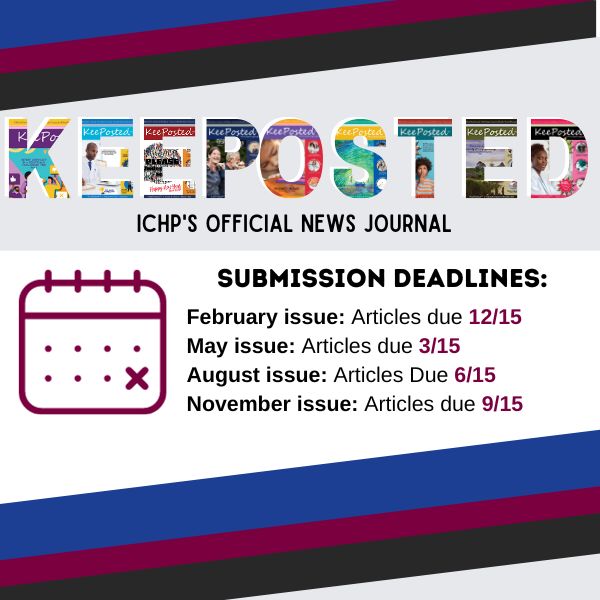Resources - Keeposted Submission
Please carefully review these submission guidelines BEFORE you begin writing. Use the information below to help frame your thoughts. KeePosted editors and ICHP reserve the right to decide at any point in the process not to publish an article. 

Questions? Contact ICHP Communications Manager, Melissa Dyrdahl, at melissad@ichpnet.org.
Please follow these guidelines when submitting articles for publication in the College Connection column of KeePosted.
- Articles should be about school events, chapter activities, student reflections, officer profiles, or other college-related news. Articles should not be therapeutic reviews or clinical topics.
- Articles should be no longer than 750 words in Times New Roman 12 pt font. Exceptions will be made on a case by case basis by the editors.
- Chapter advisors or designees shall review the contents of all articles for appropriateness before they are submitted to the editors.
- Editors will review and edit for grammar, sentence structure, and overall flow of the article. Content will be reviewed for appropriateness and adherence to these guidelines. Feedback will be provided to the students in the form of tracked changes to the document. If the author has questions, they may contact the responsible editor.
- Pictures may be submitted and will be published based on space availability and appropriateness. Captions should be sent with all pictures.
- The following formats should be used at the top of all submissions.Article Title
By: Name, PS-4 (or appropriate class designation), ICHP Office Title (or Member)
University Name and School of Pharmacy - Articles should be submitted by each issue's deadline via email to Editor Jennifer Phillips (jennifer.a.phillips@gmail.com) and Design Editor Melissa Dyrdahl (melissad@ichpnet.org).
Educational Affairs Division
Please follow these guidelines when submitting articles for publication in the Educational Affairs Division's column of KeePosted. Articles should be of general interest to health systems pharmacists. Examples include Residency Projects, Articles based upon Posters, Frequent and interesting Drug Information Queries, etc.
Format
Clinical Consultation: Brief advice on how to handle specific drug therapy problems. The answers are based on systematic review of the literature that focuses on the specific question.
Primers: Intended as introductions to various fields of knowledge that are of interest to pharmacists in health systems. Can be reviews of basic information in areas related to pharmacy (e.g., pharmaceutics or physiology) or those further from the mainstream of pharmacy (e.g., advances in nondrug health care technology).
Notes: Includes (1) practical innovations or solutions to everyday practice problems, (2) updates or elaborations on work previously published by the same authors, (3) confirmations of research findings previously published by others, and (4) short research reports or posters, including practice surveys, of modest scope or interest. The text should be concise, and the number of references, tables, and figures should be limited.
Educational Pearls: Practical suggestions/reflections for example about serving as a preceptor, staff development, continuing professional development, preparing for a residency interview, attending a national meeting.
Additional Requirements
- Maximum word length – 1000 words of text (does not include references or tables)
- The article should be at the appropriate reading level/sophistication of that found in the primary literature.
- Articles must be referenced, if applicable, using the AJHP Style - http://www.ashp.org/DocLibrary/AJHP/References.aspx
- The use of pictures, graphs, tables, protocol forms, etc. is highly encouraged. You must obtain copyright permission if you are using intellectual property.
Submission
- Articles written by students must be reviewed by their preceptor prior to submission.
- Articles written by residents must be reviewed by their Residency Director prior to submission.
- Student and resident articles are to be submitted by their preceptor or residency director, respectively, on behalf of the student or resident.
- Articles are to be submitted in a Word file to Melissa Dyrdahl, ICHP Communications Manager, at melissad@ichpnet.org.
- The final submission will be forwarded to the ICHP Educational Affairs Division, and if deemed appropriate, will be forwarded to the ICHP KeePosted editor. The ICHP editor has the authority to decide whether the submission is to be published. The Educational Affairs Division or editor may return submissions for revision.
Professional Affairs Division
- Maximum word length – 1000-words (keep it clear and concise)
- When citing evidence, please indicate the quality of the evidence being cited (e.g., randomized clinical trial, observational study, case study, animal study, in vitro study) and comment on the possible limitations of this evidence. For more information about this, please see the President’s Message from the June 2014 KeePosted
- Submissions should include the category under which the article falls (ex. Pharmacy Practice, Medication Safety, or Best Practice)
- If you are a student or resident submitting an article, include the name and contact information of your preceptor/residency director who has reviewed your article prior to submission
- Describe the issue, event, policy, or guideline, including the rationale for implementing it. Of note, the rationale should include an appropriate review of the literature on this topic.
- Describe how the issue, event, policy, or guideline will impact pharmacy practice.
- Describe demographics of institution(s) in one sentence.
- Describe the safety or practice issue in one or two sentences.
- Briefly describe the process that was implemented to address the issue
- Summarize the data that was collected (The use of pictures, graphs, tables, protocol forms, etc. is encouraged)
- Describe what lessons were learned and what you would do differently. Describe the barriers to implementation in one or two sentences.
- Articles are written by new practitioners within 10 years of graduation.
- Students may co-author articles with a new practitioner. The new practitioner must review the contents prior to submission.
- Topics and authors should be approved by the NPN Executive Committee prior to submission.
- Topics may include anything relevant to new practitioners. Examples include mentorship, precepting skills, legislative advocacy, interviewing tips, residency pearls, work/life balance, NPN event recaps, etc. For additional ideas, please contact the NPN Chair.
- Articles should be no longer than 1000 words in Times New Roman 12 pt font.
- Articles must be referenced, if applicable, using the AJHP Style - http://www.ashp.org/DocLibrary/AJHP/References.aspx.
- Pictures are encouraged and will be published at the discretion of the editors. Captions should be sent with all pictures.
- A signed photo release form from each eligible person must be submitted with pictures that include patients or non-ICHP members.
- All articles must be submitted to the current NPN Chair two weeks prior to the official KeePosted submission deadline to provide time for peer review by an NPN member.
- Articles will be peer reviewed for appropriateness and adherence to these guidelines.
- ICHP will publish a limited number of opinion/editorial pieces per year in the KeePostedÔ.
- Articles should be no longer than 1000 words in length.
- Articles must contain the name of all authors (i.e., no “anonymous” pieces) and any potential conflicts of interest.
- Articles should be non-commercial in nature and of general interest to the readership of KeePostedÔ. All submitted opinion/editorial articles submitted to this column will be reviewed for appropriateness and final approval will rest with the KeePostedÔ committee. Authors are encouraged to submit ideas for Op-Ed pieces in advance to the KeePostedÔ editors.
